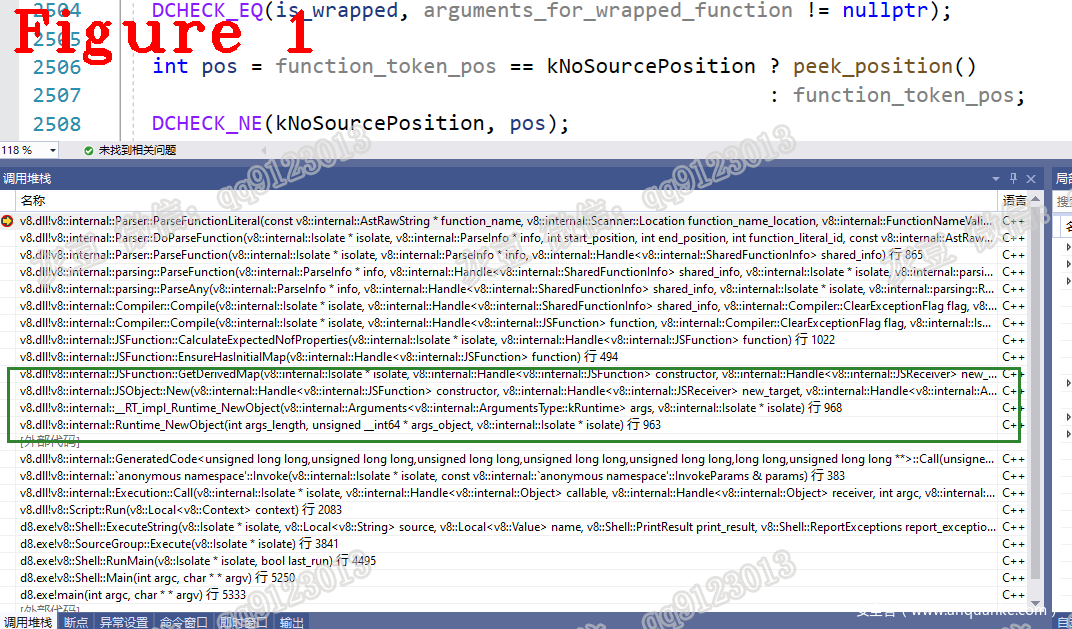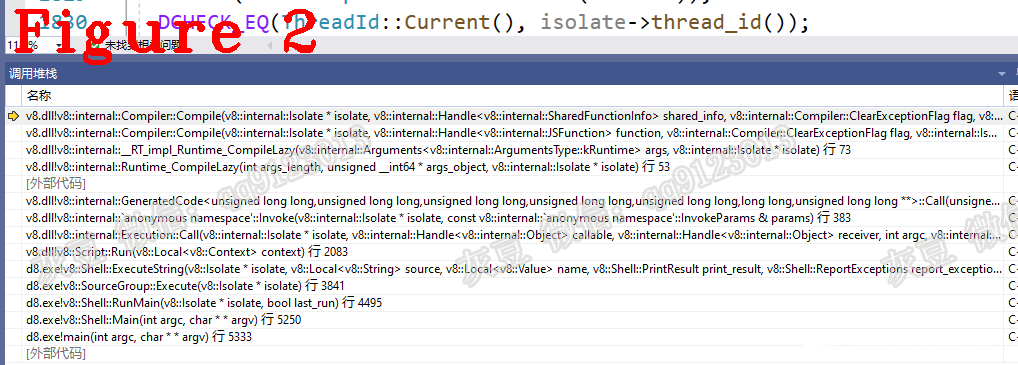1 摘要
本篇文章是 Builtin 专题的第八篇。本篇文章将跟踪 Bytecode 的执行过程,在该过程中讲解 Lazy Compile 的启动方式、工作流程以及重要的数据结构,同时也会介绍与 Lazy Compile 相关的 Builtin。
2 Lazy Compile 的启动
在进入 Lazy Compile 之前,先要了解 Bytecode 的执行过程,借助此过程来了解 Lazy Compile 的启动方式。源码如下:
1. function ignition(s) {
2. this.slogan=s;
3. this.start=function(){eval('console.log(this.slogan);')}
4. }
5. worker = new ignition("here we go!");
6. worker.start();
7. //............分隔线................
8. --- AST ---
9. . . FUNCTION "ignition" = function ignition
10. . EXPRESSION STATEMENT at 106
11. . . ASSIGN at 113
12. . . . VAR PROXY unallocated (0000016B96A17A78) (mode = DYNAMIC_GLOBAL, assigned = true) "worker"
13. . . . CALL NEW at 115
14. . . . . VAR PROXY unallocated (0000016B96A17790) (mode = VAR, assigned = true) "ignition"
15. . . . . LITERAL "here we go!"//...........省略..............
16. //...............分隔线.................
17. 0000025885361EAE @ 0 : 13 00 LdaConstant [0]
18. 0000025885361EB0 @ 2 : c2 Star1
19. 0000025885361EB1 @ 3 : 19 fe f8 Mov <closure>, r2
20. 0000025885361EB4 @ 6 : 64 51 01 f9 02 CallRuntime [DeclareGlobals], r1-r2
21. 0000025885361EB9 @ 11 : 21 01 00 LdaGlobal [1], [0]
22. 0000025885361EBC @ 14 : c2 Star1
23. 0000025885361EBD @ 15 : 13 02 LdaConstant [2]
24. 0000025885361EBF @ 17 : c1 Star2
25. 0000025885361EC0 @ 18 : 0b f9 Ldar r1
26. 0000025885361EC2 @ 20 : 68 f9 f8 01 02 Construct r1, r2-r2, [2]
27. 0000025885361EC7 @ 25 : 23 03 04 StaGlobal [3], [4]
28. 0000025885361ECA @ 28 : 21 03 06 LdaGlobal [3], [6]
29. 0000025885361ECD @ 31 : c1 Star2
30. 0000025885361ECE @ 32 : 2d f8 04 08 LdaNamedProperty r2, [4], [8]
31. 0000025885361ED2 @ 36 : c2 Star1
32. 0000025885361ED3 @ 37 : 5c f9 f8 0a CallProperty0 r1, r2, [10]
33. 0000025885361ED7 @ 41 : c3 Star0
34. 0000025885361ED8 @ 42 : a8 Return
35. //..............省略................
36. - length: 5
37. 0: 0x02841b4e1d31 <FixedArray[2]>
38. 1: 0x02841b4e1c09 <String[8]: #ignition>
39. 2: 0x02841b4e1c51 <String[11]: #here we go!>
40. 3: 0x02841b4e1c39 <String[6]: #worker>
41. 4: 0x02841b4e1c71 <String[5]: #start>
上述代码分为三部分,第一部分(1-6 行)是本文使用的测试代码,其中第 5 行会启动 Lazy Compile;第二部分(8-15 行)是测试代码的 AST;第三部分(17-41 行)是测试代码的Bytecode。我们从 Bytecode 讲起:
(1) LdaGlobal [1], [0](21 行)使用常量池[1]中的字符串作为 Key 获取全局对象,也就是获取 ignition 函数;Star1(22 行)把 ignition 存入r1;Ldar r1(25 行)从 r1 中取出 ignition 并存入累加寄存器;
(2) LdaConstant [2](23 行)和 Star2(24 行)把字符串“here we go!”存入 r2。
Construct r1, r2-r2, [2](26 行)构造 ignition 函数时会启动 Compiler,源码如下:
1. RUNTIME_FUNCTION(Runtime_NewObject) {
2. HandleScope scope(isolate);
3. DCHECK_EQ(2, args.length());
4. CONVERT_ARG_HANDLE_CHECKED(JSFunction, target, 0);
5. CONVERT_ARG_HANDLE_CHECKED(JSReceiver, new_target, 1);
6. RETURN_RESULT_OR_FAILURE(
7. isolate,
8. JSObject::New(target, new_target, Handle<AllocationSite>::null()));
9. }
10. //.............分隔线...............
11. int JSFunction::CalculateExpectedNofProperties(Isolate* isolate,
12. Handle<JSFunction> function) {
13. int expected_nof_properties = 0;
14. for (PrototypeIterator iter(isolate, function, kStartAtReceiver);
15. !iter.IsAtEnd(); iter.Advance()) {
16. Handle<JSReceiver> current =
17. PrototypeIterator::GetCurrent<JSReceiver>(iter);
18. if (!current->IsJSFunction()) break;
19. Handle<JSFunction> func = Handle<JSFunction>::cast(current);
20. // The super constructor should be compiled for the number of expected
21. // properties to be available.
22. Handle<SharedFunctionInfo> shared(func->shared(), isolate);
23. IsCompiledScope is_compiled_scope(shared->is_compiled_scope(isolate));
24. if (is_compiled_scope.is_compiled() ||
25. Compiler::Compile(isolate, func, Compiler::CLEAR_EXCEPTION,
26. &is_compiled_scope)) {
27. } else {
28. }
29. }
30. }
上述代码分为两部分,Runtime_NewObject 中 New()(第 8 行)创建新对象,也就是创建 ignition 函数。New() 中会调用第二部分代码(11-30 行)。第 24 行代码计算 ignition 的属性时会启动 Compiler 生成并执行字节码,源码如下:
00000258853621BE @ 0 : 82 00 04 CreateFunctionContext [0], [4]
00000258853621C1 @ 3 : 1a f9 PushContext r1
//...省略............
00000258853621E7 @ 41 : a8 Return
上述代码执行时不会启动 Compiler,所以 Return 指令会返回到测试代码并执行第32行 CallProperty0 r1, r2, [10],源码如下:
1. IGNITION_HANDLER(CallProperty0, InterpreterJSCallAssembler) {
2. JSCallN(0, ConvertReceiverMode::kNotNullOrUndefined);
3. }
4. //.............分隔线......................
5. void JSCallN(int arg_count, ConvertReceiverMode receiver_mode) {
6. Comment("sea node1");
7. const int kFirstArgumentOperandIndex = 1;
8. const int kReceiverOperandCount = (receiver_mode == ConvertReceiverMode::kNullOrUndefined) ? 0 : 1;
9. const int kReceiverAndArgOperandCount = kReceiverOperandCount + arg_count;
10. const int kSlotOperandIndex = kFirstArgumentOperandIndex + kReceiverAndArgOperandCount;
11. TNode<Object> function = LoadRegisterAtOperandIndex(0);
12. LazyNode<Object> receiver = [=] {return receiver_mode == ConvertReceiverMode::kNullOrUndefined
13. ? UndefinedConstant() : LoadRegisterAtOperandIndex(1); };
14. TNode<UintPtrT> slot_id = BytecodeOperandIdx(kSlotOperandIndex);
15. TNode<HeapObject> maybe_feedback_vector = LoadFeedbackVector();
16. TNode<Context> context = GetContext();
17. CollectCallFeedback(function, receiver, context, maybe_feedback_vector,
18. slot_id);
19. switch (kReceiverAndArgOperandCount) {
20. case 0:
21. CallJSAndDispatch(function, context, Int32Constant(arg_count),
22. receiver_mode);
23. break;
24. case 1:
25. CallJSAndDispatch(
26. function, context, Int32Constant(arg_count), receiver_mode,
27. LoadRegisterAtOperandIndex(kFirstArgumentOperandIndex));
28. break;//....省略.......
29. default:
30. UNREACHABLE();
31. }
32. }
33. };
上述代码中,r1 寄存器的值是 JSFunction start,r2 寄存器的值是 ignition map。第 2 行代码调用 JSCallN();第 9 行代码 kReceiverAndArgOperandCount 的值是2;第 11 行代码 function 的值是 JSFunction start;第 25 行代码 CallJSAndDIspatch() 会使用 TailCallN() 来完成函数的调用,最终进入 Lazy Compile。图 1 给出了此时的调用堆栈。
3 Lazy Compile
在测试代码中启动 Lazy Compile 的方式是 Runtime,源码如下:
1. RUNTIME_FUNCTION(Runtime_CompileLazy) {
2. HandleScope scope(isolate);
3. DCHECK_EQ(1, args.length());
4. CONVERT_ARG_HANDLE_CHECKED(JSFunction, function, 0);
5. Handle<SharedFunctionInfo> sfi(function->shared(), isolate);
6. #ifdef DEBUG
7. if (FLAG_trace_lazy && !sfi->is_compiled()) {
8. PrintF("[unoptimized: ");
9. function->PrintName();
10. PrintF("]\n");
11. }
12. #endif
13. StackLimitCheck check(isolate);
14. if (check.JsHasOverflowed(kStackSpaceRequiredForCompilation * KB)) {
15. return isolate->StackOverflow();
16. }
17. IsCompiledScope is_compiled_scope;
18. if (!Compiler::Compile(isolate, function, Compiler::KEEP_EXCEPTION,
19. &is_compiled_scope)) {
20. return ReadOnlyRoots(isolate).exception();
21. }
22. DCHECK(function->is_compiled());
23. return function->code();
24. }
上述代码第 3 行 function 的值是 JSFunction start;第 18 行代码启动编译流程,源码如下:
1. bool Compiler::Compile(...省略....) {
2. Handle<Script> script(Script::cast(shared_info->script()), isolate);
3. UnoptimizedCompileFlags flags =
4. UnoptimizedCompileFlags::ForFunctionCompile(isolate, *shared_info);
5. UnoptimizedCompileState compile_state(isolate);
6. ParseInfo parse_info(isolate, flags, &compile_state);
7. LazyCompileDispatcher* dispatcher = isolate->lazy_compile_dispatcher();
8. if (dispatcher->IsEnqueued(shared_info)) {
9. }
10. if (shared_info->HasUncompiledDataWithPreparseData()) {
11. }
12. if (!parsing::ParseAny(&parse_info, shared_info, isolate,
13. parsing::ReportStatisticsMode::kYes)) {
14. return FailWithPendingException(isolate, script, &parse_info, flag);
15. }//..........省略........
16. FinalizeUnoptimizedCompilationDataList
17. finalize_unoptimized_compilation_data_list;
18. if (!IterativelyExecuteAndFinalizeUnoptimizedCompilationJobs(
19. isolate, shared_info, script, &parse_info, isolate->allocator(),
20. is_compiled_scope, &finalize_unoptimized_compilation_data_list,
21. nullptr)) {
22. return FailWithPendingException(isolate, script, &parse_info, flag);
23. }
24. FinalizeUnoptimizedCompilation(isolate, script, flags, &compile_state,
25. finalize_unoptimized_compilation_data_list);
26. if (FLAG_always_sparkplug) {
27. CompileAllWithBaseline(isolate, finalize_unoptimized_compilation_data_list);
28. }
29. return true;
30. }
上述代码与之前讲的编译流程一致,请自行分析。注意: 第 27 行是 V8 新加入的编译组件,它的位置在 Ignition 和 Turbofan 之间。图 2 给出了此时的调用堆栈。
技术总结
(1) 本文涉及两次 Compile,一次用于计算对象属性,另一次是 Lazy Compile;
(2) TailCallN() 用于在当前 Block的尾部添加 Node 并完成函数调用,详见 sea of nodes。
好了,今天到这里,下次见。
个人能力有限,有不足与纰漏,欢迎批评指正
微信:qq9123013 备注:v8交流 邮箱:v8blink@outlook.com










发表评论
您还未登录,请先登录。
登录